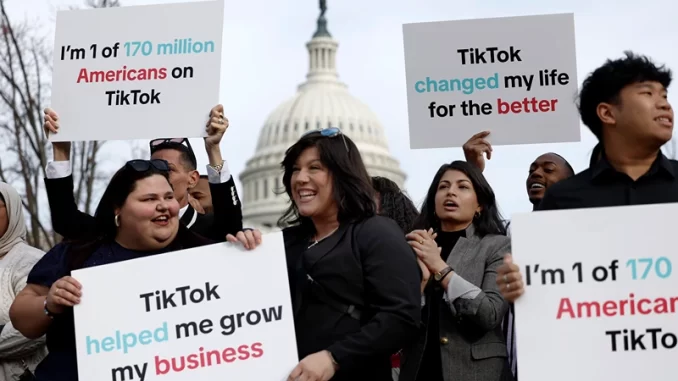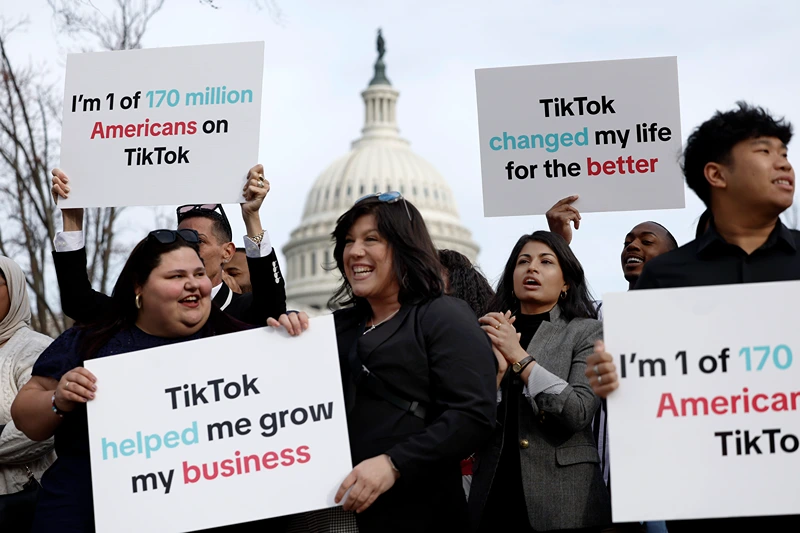

OAN Staff Blake Wolf
2:04 PM – Thursday, January 16, 2025
The Supreme Court has unanimously voted to uphold President Joe Biden’s law barring TikTok from users in the United States after the Chinese parent company refused to sell the platform.
Advertisement
Biden previously signed the controversial law last April, giving TikTok’s Chinese parent company, ByteDance, 270 days to sell TikTok due to “national security” concerns regarding the company’s “data collection practices and relationship with a foreign adversary.”
“There is no doubt that, for more than 170 million Americans, TikTok offers a distinctive and expansive outlet for expression, means of engagement, and source of community,” the court wrote following its unanimous decision.
“But Congress has determined that divestiture is necessary to address its well-supported national security concerns regarding TikTok’s data collection practices and relationship with a foreign adversary,” the statement continued.
TikTok representatives argued that the law was “unconstitutional,” as it infringes on the First Amendment rights of the 170 million American users, along with the company itself.
“We are confident and we will keep fighting for your rights in the courts,” stated TikTok CEO Shou Chew. “The facts and the Constitution are on our side and we expect to prevail.”
Meanwhile, President-elect Donald Trump has issued support for TikTok, previously stating that he would “save TikTok,” as the app played a significant role in garnering GOP support from younger voters.
“The Supreme Court decision was expected, and everyone must respect it,” Trump wrote in a Friday Truth Social post following the verdict. “My decision on TikTok will be made in the not too distant future, but I must have time to review the situation. Stay tuned!”
Chew took to social media to express his gratitude for Trump’s support of the platform.
“I want to thank President Trump for his commitment to work with us to find a solution that keeps TikTok available in the United States,” Chew stated. “This is a strong stand for the First Amendment and against arbitrary censorship.”
“We are grateful and pleased to have the support of a president who truly understands our platform – one who has used TikTok to express his own thoughts and perspectives, connecting with the world and generating more than 60 billion views of his content in the process,” he added.
The TikTok ban is set to take effect on Sunday, although the Biden administration revealed that it plans to leave the enforcement of the ban to the incoming Trump administration.
“Given the sheer fact of timing, this Administration recognizes that actions to implement the law simply must fall to the next Administration, which takes office on Monday,” stated White House Press Secretary Karine Jean-Pierre.
It is currently unclear whether TikTok will continue to allow American users to access the app when the ban goes into effect on Sunday following Jean-Pierre’s comments, although it reportedly previously considered “going dark” as the law goes into effect.
With the ban imminent, American TikTok users have been moving to an alternative social media app called Xiaohongshu, or “RedNote,” which is also Chinese-owned.
The app appeared on Apple’s app store beginning on Tuesday, bringing in roughly three million U.S. users, according to Forbes.
“This appears to be the kind of app that the statue would apply to and could face the same restrictions as TikTok if it’s not divested,” an unnamed U.S. official told CBS News.
American TikTok users were previously not able to connect with Chinese citizens, as the TikTok app in its international form was not available for Chinese citizens to access, however the RedNote app is connecting Americans with more Chinese users than ever before.
With the rise of American users downloading RedNote, cybersecurity officials are raising the same concerns they had with Chinese-owned TikTok, if not to a greater degree.
“RedNote was never meant for outside of the China market. All of the data sharing and all the servers to which the data is being shared is in China,” stated Adrianus Warmerhoven, a cybersecurity expert at Nord VPN.
“It means they are exempt from all of these data protections and outside of the view of the American government,” Warmerhoven continued.
“Its terms and conditions are in Mandarin, leaving non-Chinese speaking users unclear about what data is collected and how it’s used,” he added. “I’m pretty sure those millions who are moving over are not using Google Translate to read [the terms and conditions] so they don’t know what they are agreeing to.”
Stay informed! Receive breaking news blasts directly to your inbox for free. Subscribe here. https://www.oann.com/alerts
Advertisements below

